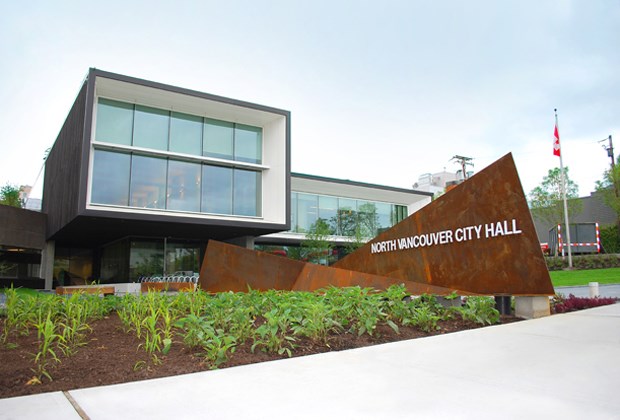It's not amalgamation. It's not even a study into potential amalgamation.
But City of North Vancouver council has given the OK for staff to investigate what level of detail a province-led study into restructuring the two municipalities to have more shared services might produce, should one be done.
Coun. Guy Heywood brought a motion deep behind enemy lines to the city's council chambers Monday night, asking the city to seek the province's help in doing a restructuring study.
Joining the two municipalities, which were divided up in 1907, has long been perceived to only benefit the comparatively cash-poor District of North
Vancouver. The district passed a similar motion in February.
When it became clear that his original motion wouldn't get the votes to pass, Heywood tweaked it to appeal to Coun. Rod Clark, an amalgamation opponent who had said he couldn't support spending taxpayer dollars on a study that would only look at the issue from "35,000 feet up."
After the amended motion appeared doomed to fail and some procedural wrangling, council settled on asking staff to look into the matter.
But, regardless of whether Heywood can find enough votes to make the study happen or what it may conclude, amalgamation is still a dirty word south of 29th Street.
Coun. Pam Bookham showed some support for the motion but only after stating she was adamantly opposed to any future amalgamation on the grounds that the city and district had grown to have
"fundamental cultural differences with respect to the kind of communities we are and aspire to be."
But given that a study may lead to more efficient ways of cost sharing, Bookham expressed support as a nod to the business community that routinely pushes for another look at amalgamation.
"They seem to think amalgamation is the answer. I think it is more likely who you put on council that is the answer," she said.
Coun. Craig Keating noted the district has a host of public buildings that will one day need to be replaced, including several rec centres, libraries, fire halls and "miles and miles" more roads and underground pipes to serve the sprawling single-family home neighbourhoods.
Adding to that point, Mayor Darrell Mussatto, noted that the city has more than $100-million in the bank with $80 million more stashed away in reserves for replacing infrastructure.
"They want access to our funds and I'm not on for that," he said. "Until the district gets their financial house in order, until they've dealt with their liabilities like concrete asbestos pipes they have to replace, I'm not interested in talking to them."
Beyond the usual argument that previous amalgamation attempts in Ottawa, Halifax, Toronto and Calgary have resulted in higher costs, Mussatto also noted that all highdensity development that would happen in a hypothetically united North Vancouver would happen in the old city's limits. Even with his reputation as a "developer guy" Mussatto said, "there comes a limit."
But amalgamation, or at least a detailed study into shared services, had at least one other champion on council in Coun. Don Bell, who was once the district's mayor.
"Too often in the past, when I have discussed this with other political figures on the North Shore. .. the issue has been 'My mind's made up. Don't
bother confusing me with the facts.' There's almost an emotional response. I think what's needed is a rational response based on facts. I think it never hurts to do an update," he said. "Let's get the facts and let the facts speak for themselves. Let's do it in an unbiased way. Let's get the information and make it available to the public and have the discussion with the public about (it)."
Heywood stressed that the old assumptions about amalgamation aren't necessarily true anymore.
"We're not talking about amalgamation. We're talking about opening the books, taking a look at how we're doing and looking at how we can do better," he said. "The value of your organization is not what's in your bank account. It's the money you can get in the future. The city and district tax rates have been indistinguishable for years," he said, though he conceded that district utility bills are higher because they must serve single-family neighbourhoods.



